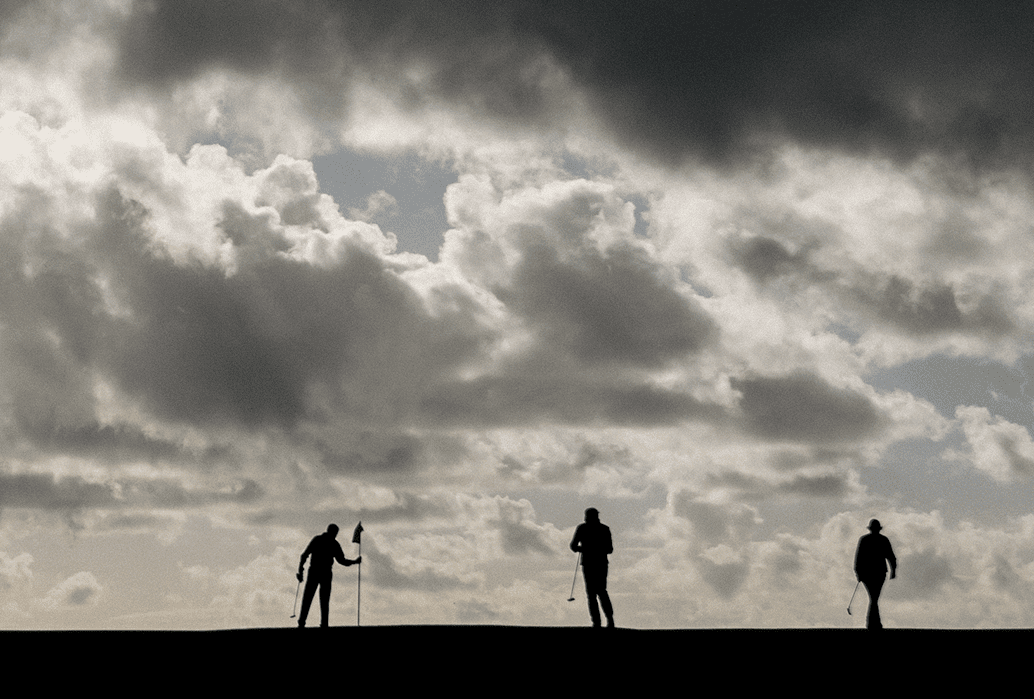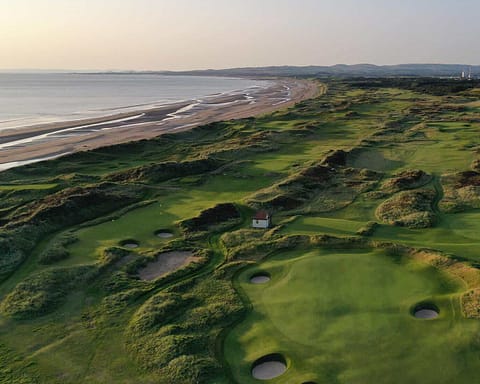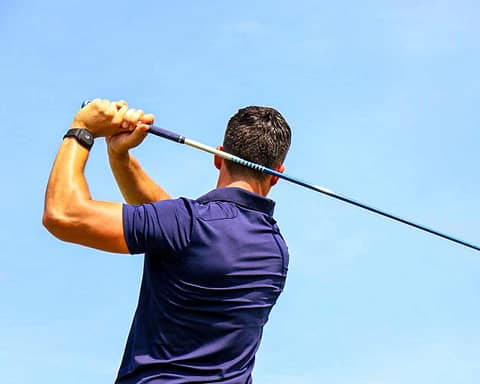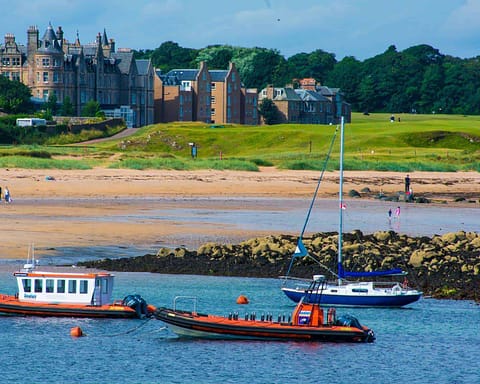Fyfe Golf unashamedly celebrate Scotland’s rich and storied manufacturing heritage.
Their beautiful, handmade products and accessories already grace golf bags and golfers far and wide and each of them come proudly having been ‘Made in Scotland.’ All fabrics are sourced from the finest Scottish mills and weavers and their mission is to reconnect golf with Scottish manufacturing and blend tradition and modernity through their creations.
Fyfe Golf go further, however. Every decision they make considers the impact it might make on the planet. To you and I that might be replacing a divot, repairing a pitch mark, raking a bunker, to Fyfe it comes to sourcing sustainable materials and using responsible methods.
We spoke to Neil Rennie, co-founder of Fyfe, to find out more.
Q: Talk us through the journey from the seed of the idea for Fyfe to making it a reality, Neil.
A: The idea for Fyfe was a culmination of a passion for golf, Scottish manufacturing and the concern around the climate change challenge and the lack of sustainable options in the market. There is a family heritage of making and creating in Scotland. My grandad and grandmother both worked in the Grandholm Mill in Aberdeen, which was famous for producing the Crombie Cloth. The mill closed in the early 90’s. I was always intrigued by how the fabrics were made and the craft behind it.

My other grandfather was a blacksmith and spent part of his career building ships in the Aberdeen shipyards, there was always an amazement for me on how things were built and the purpose they served. The threat of climate change created the desire to do something to help directly with sustainable projects and raise further awareness around the subject. The last ingredient was picking up the clubs again about 5 or 6 years ago. I played golf a little bit in my teens, but it was only in my early 30’s that I picked up the clubs again and it seemed so many of my friends had also got into the game. Suddenly there was a whole bunch of us teeing it up. The bug well and truly took hold.
Going around the pro shops and golf retailers, I couldn’t find that more elevated product, with heritage and provenance. Everything was mass-produced and heavily branded. More so, there was almost no sustainable consideration in the product available. I felt there was a real disconnect between the essence of golf and the associated clothing and accessories. Surely, golf with all its history in Scotland, there should be a Made in Scotland golf brand, something with real authenticity and purpose? All those things came together and along with a small group consisting of friends and family, we decided to create Fyfe.

The brand is really a passion project for us all. My background is in fashion, so I already had the network and knowledge of the Scottish manufacturing base and along with Fyfe’s other co-creators, we set up a joint venture workshop where we make the headcovers (and more products are being developed as we speak). In addition to that we have selected the best heritage factories and mills across Scotland to produce our other product such as the socks and hats. It took over a year to set things and source of the sustainable materials that we use and initial designs. Our key brand promise is that we will only make products that we genuinely believe are better and have less impact than what already exists in the market. When trying to create the most sustainable products possible, sometimes availability can be a challenge so we were not able to launch with all the products we planned and you must be patient, we will continue to do so as we continue to expand our range.
Q: Tell us about the products you sell – why do you focus on those in particular?
A: Our focus is on accessories initially launching with headcovers, merino beanie hats and socks. We are finalising development of a new range of shoe bags and valuable pouches which will be ready very soon.
In essence, providing golfers a way to renew their existing kit and make it that little bit more of an individual set up. For example, our headcovers are a way to refresh your golf bag and clubs without buying a brand-new set. We certainly believe in buying better and buying less.
There are more creations in the pipeline which we are aiming to launch within the next couple of months. To some degree, making in Scotland dictates the type of products and materials you can use so this means we keep the product range small and focused. As well as making in Scotland, we focus on using Scottish textiles such as Harris Tweed and canvas from Halley Stevensons which is a heritage waxed canvas mill in Dundee.

We source our knitwear yarns from a mill situated in Loch Leven, our hats are made in Ayrshire and socks in Hawick. The workshop is based in Fife where we also run our distribution and warehousing. As mentioned, in all our product we pursue the most sustainable materials and methods in making Fyfe’s products. In our headcovers we use organic cotton fleece lining, natural rubber elastic (which keeps the headcovers secure on the club) and have used recycled labels made from post-consumer products. Our knitwear yarns are RWS certified (this cover the 5 freedoms of animal welfare and sustainable farming practices for wool production) and canvas and cotton we use is either BCI or GOTS certified. Lots of acronyms, but basically these are the recognised bodies that provide the authenticity of the sustainable credentials of the materials we use.
Q: Why is sustainability so important to you and do you think we’ll see some of the bigger manufacturers incorporating into the way they work?
A: It’s hugely important to us. All products we make have a lot of thought and consideration into its environmental impact. The reality is so much of the product made for golf is unsustainable. Polos made from polyester, hats made from acrylic, products made in coal powered factories.
The amount of petroleum derived product in golf is significant. For the bigger manufacturers and brands, customer behaviours are changing, and brands will need to ensure they are responding to this increased demand for sustainability and transparency. There are efforts already being made, most large corporate companies have a published sustainable strategy so it seems there is an adoption of a sustainable ethos as customers expect to see this now, but generally these reports only highlight targets but no real clear pathway to achieving those targets.
I do worry this is treated more as a marketing tool rather than a genuine shift in operating practices. However, it is difficult for the large established sportswear brands as the current manufacturing infrastructure will take time to move to a fully sustainable operation. For example, you have seen from COP26 in Glasgow that the likes of China and India are reluctant to move fast on the phasing out of coal as an energy source which is one of the largest contributors to GHG emissions. Whilst the big companies produce in these markets, there will be a limitation on their ability to cut their greenhouse emissions to the levels being advised by the science community. In short, change is happening but not quickly enough.
I remain optimistic that we can reverse climate change and I do believe we will start to see efforts increase globally on this issue over the next few years, but more needs to be done and the speed of change needs to be addressed.

Q: We’re all about golf travel and adventure – where do you love to play the game?
A: This may seem an obvious and bias answer, but it must be Scotland. I have been fortunate to play in a few countries, it can be fun to play on the wide resort courses in the US, enjoy the sun-soaked Mediterranean fairways, but nothing beats Scotland. The links from the famous courses to the local delights, the amazing Islands off the West Coast to the slightly more unknown 9-hole inland courses.
The variety, the scenery, the history. There is adventure in travelling across Scotland to these courses and exploring them all. Travelling around the Hebridean islands by ferry, playing golf, and discovering the amazing landscape, there are no better adventures in my mind. I think more people from across the UK have discovered this during the various lockdowns and long may this continue.

A: There are many things we are excited about for the remainder of the year. We are working on more products which we are excited to release over the next couple of months as well as further collaborations that will be announced throughout the year. One of our core focuses is to help fund environmental projects important to use. Re-wilding the Scottish Highlands and our membership of 1% For The Planet are the two projects we have started with and we want to do more and more in this area. Further projects are being discussed and we expect to launch another significant initiative in the Autumn.
Whilst we only launched in November last year, we have seen a great reaction to the brand and our products. We simply want to create the best possible artisan led golf accessories we can, with the least impact on the environment and provide our customers with an exceptional quality, ‘Made in Scotland’ product that will accompany them for many years on their golf adventures.
*For more information and to view Fyfe’s products visit www.fyfegolf.com




